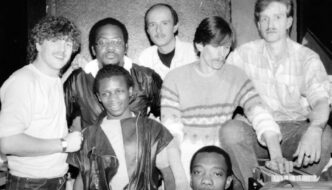
Life in 12 Bars is the heartbreaking account of a man lain bare. Looking back on Eric Clapton’s life, the documentary travels from his soaring highs to his sinking lows. It is a heartbreaking series of events – at times wholly undeserved, while at other times slightly more questionable – but always undeniably tragic.
The film focuses on the man more than the music, and I’d go as far as to say it is the most character-based music documentary I’ve seen. As a huge Clapton fan, it was two hours of wonder and intrigue; an all-absorbing account of his life. While a lesser fan may find their interest dips in the slower-paced parts of the film, they would do well not to forget the magnitude of the effect Clapton had on music and British culture, and the film certainly doesn’t neglect that.
The film portrays well enough that the sheer skill he possesses as a musician was enough to bring the blues to a mainstream audience that,when the famous graffiti “Clapton is God” appears on screen, you believe it. The film lays out a gruelling account of Clapton’s battle with drug addiction, alcoholism, and his crippling unrequited love for Patti Boyd; the then wife of his best friend, George Harrison. Patti Boyd eventually does marry Clapton, but by that time its the 70s and Clapton has descended into depression, struggling with alcoholism and drug addiction, and hit rock bottom. After all the hardship Clapton endures, the worst of all, which occurs just as he was starting to turn his life around, is the death of his four year old son who fell out of a window from the 49th floor of a New York hotel.
The film touches on Clapton’s racist outburst at a Birmingham gig in 1976. The film does rather obviously steer clear of directly quoting what Clapton said that night, for fear of losing the audience entirely. But it does go there – which was a risk. Clapton’s rant that night which included the words: “I used to be into dope but now I’m into racism” and referred to Enoch Powell as a “great man, speaking truth” is blamed solely on the effects the drugs and alcohol had on Clapton during that time. While a brave move going there at all, rushing past the heavy topic left me feeling fairly fobbed off with a feeble excuse.
Nonetheless, your heart aches for him throughout the documentary, so that when an image of Eric Clapton sitting on the beach with his family looking the picture of health and happiness appears at the end, you can’t help but to be overcome with relief and wonder that he came out the other side.
Filed under: Film, TV & Tech, Music
Tagged with: 70s, Alcoholism, Biography, documentary, Documentary film, Eric Clapton, Life in 12 Bars, music, review, True Story



Comments